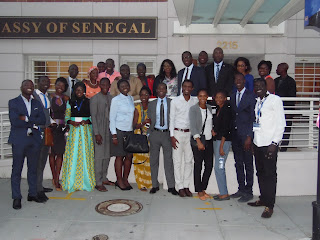The month of March is famous for ongoing celebrations dedicated to Women. From the 8th of March - during which we celebrate the worldwide day for the Defense of Women’s rights - to the 31st, many events do take place, showcasing inspirational leaders, women of all origins, in both ancient and modern societies.
JEADER (Young African Entrepreneurs working towards the Regional Economic Development) grabbed such an opportunity to celebrate women, once again, through the Super Women Leadership Conference (SWLC). This 3rd edition of the SWLC took place at Novotel Hotel on Saturday, March 18th starting 3:00 PM. They were more than 230 participants, to be part of this amazing journey, celebrating inspiring Senegalese women who delivered a pitch on the topic of this Year: TRANSFORM’ACTION.
The SWLC is an event organized during the “month of women”. It invites and acknowledges women who distinguish themselves in various sectors and is based essentially on the spirit of Entrepreneurship and Creativity. And for the second Year in a roll, the event was organized with the sponsorship of the Us Embassy in Dakar / Senegal and did reward 10 speakers with the “Jigeenindeer” Award, identifying them as leaders or pioneers in their area of expertise.
Knowing that JEADER is really focused in building the next generations of Leaders, we consider women as a key element in the development of our nation. Those amazing women speak about their motivations and the hindrances they went through. They are also invited to talk about how it feels to be a Female Leader. The event does not only convey famous people, but it also promotes Leadership by rewarding and giving the floor to anonymous, in a way to urge every woman, beside their age, their handicap or their level of literacy to believe in themselves and their abilities to bring some change for their communities.
Did I hear you say “TRANSFORM’ACTION”?
“Actions speak louder than words!” At JEADER, we profoundly believe that the impact of women empowerment goes beyond speeches or propagandas. We see it as a result of a combination of great ideas and courageous initiatives with visible impacts. It is according to this belief that we have chosen “TRANSFORM’ACTION” as the theme of this SWLC going into transforming women’s devotion and creativity to concrete actions that will foster the emergence of the country.
We then decided to promote Art and specifically Painting during this event, making sure that we highlight the tremendous work delivered by young Senegalese artist. First, with a mini fashion show meant to display and feature the latest collection of ABC-Aduuna Bul Comprendre, named ZEN’ART, handmade printed dresses designed 100% by ABC. We also had the participation of the genious KING MO who did paint a masterpiece inspired both by the Logo of the Super Women Leadership Conference, and a Butterfly, symbol of TRANSFORM’ACTION, designed by JEADER Members.
As a symbol of transformation, arts and crafts were also leveraged with handmade goodies from “Ngaay Mekhe” and some pottery inspired by SOURD’ART, Abdoulaye Diène et Mariama Fall, who are deaf, but yet did manage to make of their art, an anthem of Senegalese culture. As every year, a giveaway was offered to the top 100 women who would come on time!
The Speakers
This edition has seen the presence of Mrs. Martina Boustani, Charge of the US Embassy in Senegal and Mrs. Oulimata Sarr, Regional advisor of UN Women in Senegal, as a Keynote Speaker. Not only, was speech driven by Women economic empowerment, but it was a celebration of outstanding capabilities of Senegalese women, should that be in manufacturing industry, agribusiness, education, health & Social care, technology, fashion, beauty and design.
There was a panel with the topic “Female leadership and its role in the transformation of Africa” chaired by Mrs. Rokhaya Dièye, President of the NGO LEAD Senegal and with the the intervention of Mrs. Mame Mbayang Diome, Member of the Parliament, Mrs. Aissatou Diallo, YALI Fellow 2014 and Mrs. Oumoul Khairy Tandian, sociologist.
1.Mrs Martina Boustani (US embassy)
2.Mrs Oulimata Sarr (UN Women)
3.Dr Mame Mbayang Dione (Senegalese Parliament)
4.Mrs Aissatou Diallo (YALI Fellow 2014)
5.Mrs Oumoul Khairy Coulibaly-Tandian (Sociologist)
6.Mrs Rokhaya Ngom Ndiaye (MPS)
7.Mrs Randa Filfili (ZENA Exotic)
8.Mrs Astou Mbene Thioub (TFM/RFM)
9.Mrs Amy Niang Dieng (ORTHOPRO)
10.Miss Mboyo Sow (BAY TECH)
11.Mrs Sophie Zinga Sy (SOPHIE ZINGA)
12.Miss Tahicia Dior Gomez (TAHI LAND)
13.Miss Marie Therese Fatou Sall (EBEN ID)
14.Mrs Faty Ly (FATY LY CERAMICS)
MEMORIAL – YONI RASSOUL DIONGUE
JEADER Team, could not celebrate this SWLC, without having some thoughts for Late Yoni Rassoul Diongue, one of the jigeenindeer of JEADER in 2016 and a true ambassador of Transform’Action!
A fundraising was organized during the event, with the great leadership of the Sokhna Mbathio Ndiaye, YALI Fellow 2015. More than 480.000 XOF were taken from few of her books sold, 3 paintings of her and fundraising from the crowd. Part of this money is meant to support his family, and another part is meant to be invested in his Association HANDYCAPABLE to serve as a capital for the recipients of her association. Exceptionally, the 2017 jigeenindeer trophy was inspired by the famous drawing of our dearest Yoni Rassoul.
JEADER
Mandela Washington Fellow 2014















